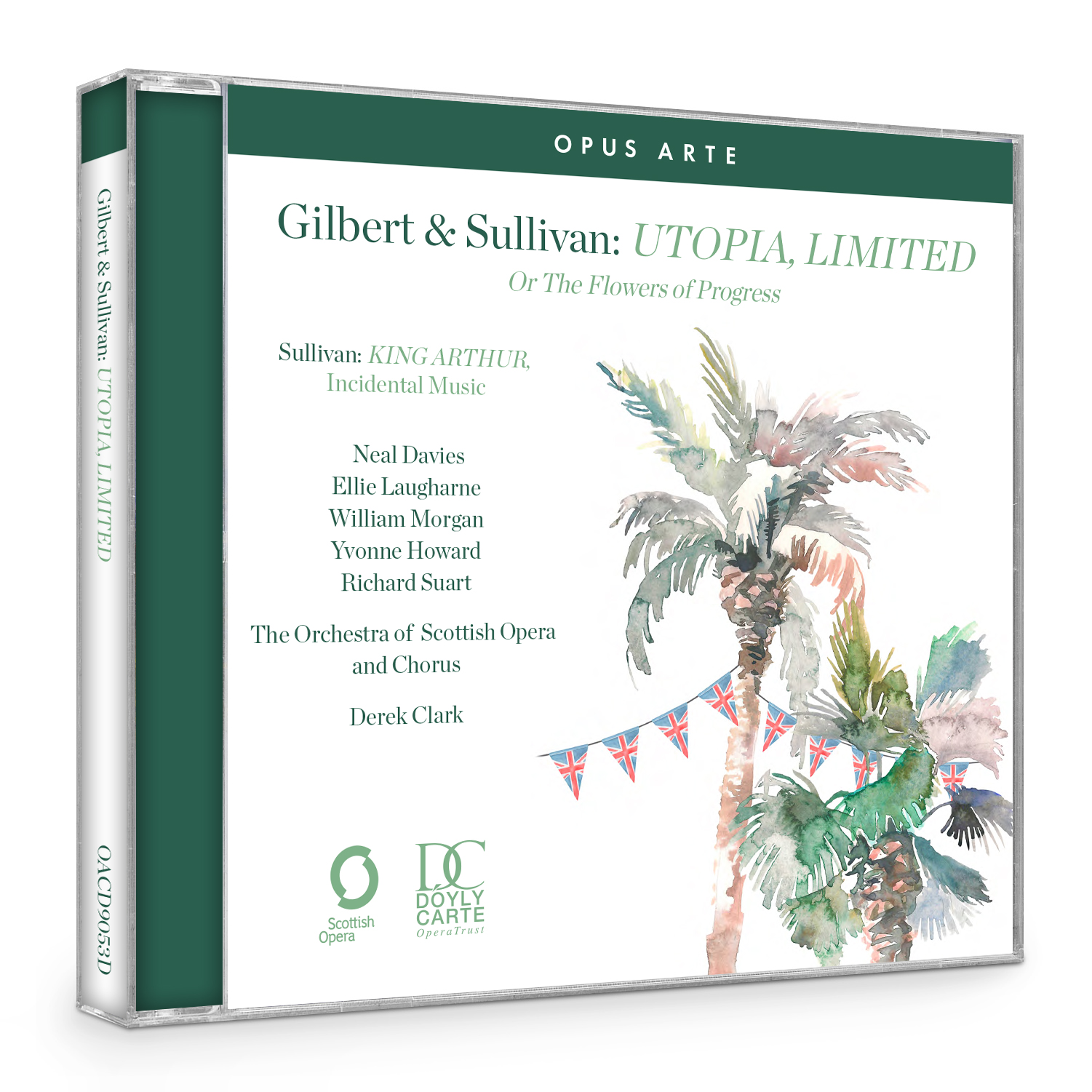Cards on the table: I’ve been a fully paid-up Gilbert & Sullivan fan since the age of seven, when a trip to an amateur production of Ruddigore ignited a passion for operetta and opera which shows no signs of abating some four decades later. Like many lovers of the Savoy operas, I can often be heard lamenting that these immensely popular works aren’t better represented on record, so it’s a special pleasure today to welcome a sparkling new account of Utopia, Limited courtesy of Scottish Opera and its former Head of Music Derek Clark – recorded in Glasgow, around semi-staged performances in the autumn of 2021.
Utopia is a work which tends to get left on the shelf, overshadowed by the duo’s earlier smash-hits such as HMS Pinafore, The Gondoliers and The Mikado (and tipping its hat to all three with varying degrees of subtlety). The pair’s penultimate collaboration, it was premiered in 1893 after a serious rift between the men had been hastily patched up by their publisher Tom Chappell, and on one level it's easy to see why the piece never achieved the popularity of its predecessors: the first act takes a good while to find its footing, and Gilbert’s libretto gets a little too deep into the weeds with its convoluted mockery of nineteenth-century corporate law. (No dialogue on this recording, so you’ll need to track down the spoken text online to follow the intricacies).
The satire of British imperialistic attitudes, however, perhaps resonates even more strongly today than it did in 1893 (although Clark notes that some of the language has been modified to avoid any suggestion of endorsing said attitudes rather than cocking a snook at them). Set on an unspecified isle of paradise, the ‘complicated plot’ hinges on King Paramount’s enthusiastic bid to ensure that his country is ‘Anglicised completely’: after receiving a Cambridge education, his eldest daughter Zara returns to Utopia with a battalion of British worthies who set about reforming the country’s infrastructure, only for the very fabric of society to unravel when the Utopians eventually out-English the English.
If Gilbert wasn’t quite on top form, the score contains some of Sullivan’s best writing - done full justice here by Clark’s zippy, flexible direction and a uniformly strong cast of British singers who often surpass their counterparts on Royston Nash’s 1975 Decca recording. Diction from all is crystal-clear but refreshingly unmannered, and everyone exudes a healthy respect for performance tradition without ever lapsing into fussiness or fustiness.
The romantic leads in particular bring true bel canto style to the proceedings, with Ellie Laugharne an assertively-sung Princess Zara (less arch and soubrettish than Pamela Field was for Nash) and William Morgan excelling as her soldier lover Captain Fitzbattleaxe: the cod-Donizetti scena in which he laments the ill-effects of passion on vocal technique comes off beautifully, precisely because this tenor can so evidently ‘do himself justice’. And the pair make wonderful work of their radiant duet ‘Words of love too loudly spoken’, where Sullivan seems to be channelling the love-music from Verdi’s Simon Boccanegra.
With astute comic timing and vocal power to burn, Neal Davies is an endearing delight as the well-meaning but vulnerable King Paramount, and his chemistry with Yvonne Howard’s glowing Lady Sophy (the mature English governess hired to educate his younger daughters) brings genuine depth and heart to their King-and-I relationship.
The many smaller roles are all cast from strength, with Mark Nathan’s unctuous Mr Goldbury making much of his Act Two paean to robust English women, and the chalk-and-cheese pairing of G&S veteran Richard Suart and newcomer Arthur Bruce (recently an outstanding Billy Budd in London) proving a joy as the anti-reform conspirators Scaphio and Phantis. And the Scottish Opera chorus raise the roof in the great unaccompanied hymn ‘Eagle high on cloudland soaring’, perhaps the finest number in the score.
Choral excerpts from the incidental music which Sullivan composed for J. Comyns Carr’s play King Arthur in 1895 make for a lovely coda, showing the composer at his most Mendelssohnian. And if you’re hungry for more G&S this summer, look out for a terrific production of The Gondoliers from the same forces, due out in August on DVD and Blu-ray...
Katherine Cooper



















